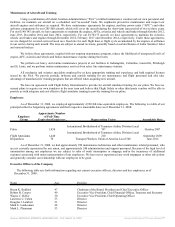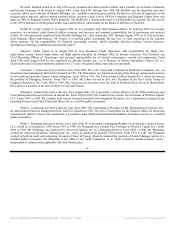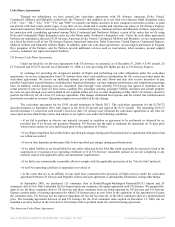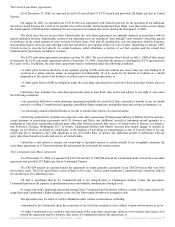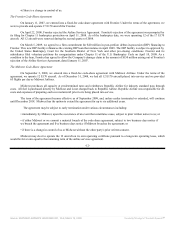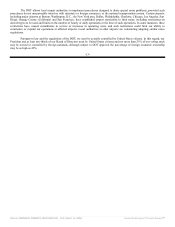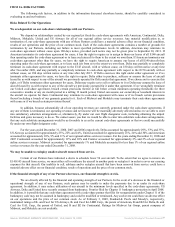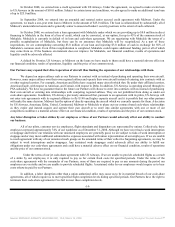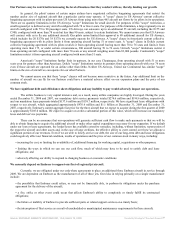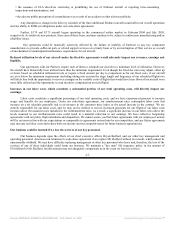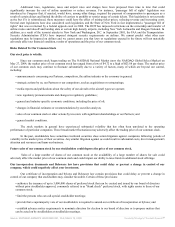Frontier Airlines 2008 Annual Report Download - page 24
Download and view the complete annual report
Please find page 24 of the 2008 Frontier Airlines annual report below. You can navigate through the pages in the report by either clicking on the pages listed below, or by using the keyword search tool below to find specific information within the annual report.
The Mokulele Code-Share Agreement
In October 2008, we entered into a fixed-fee code-share agreement with Mokulele Flight Service. Under the terms of the
agreement, we will provide and operate four E170 aircraft. As of December 31, 2008 we had two E170 aircraft placed into service and
we provided 30 flights per day as Mokulele Airlines.
Mokulele purchases all capacity at predetermined rates and reimburses Shuttle America for industry standard pass through
costs. Two aircraft went into service in November 2008. The other two aircraft are scheduled to go into service in March 2009 and
June 2009. All fuel is purchased directly by Mokulele and is not be charged back to Shuttle America. Shuttle America is responsible
for all costs and expenses of preparing each covered aircraft prior to its being placed into service.
The term of the agreement became effective as of October 2008, and, unless earlier terminated or extended, will continue
until October 2018.
The agreement may be subject to early termination under various circumstances including:
• immediately, by Mokulele, upon the occurrence of an event that constitutes cause, subject to prior written notice to us; or
• if either Mokulele or we commit a material breach of the code-share agreement, subject to two business days notice if we
breach the agreement and five business days notice if Mokulele breaches the agreement; or
• if there is a change in control of Mokulele without Shuttle America's prior written consent.
Mokulele is currently in default of its loan and code-share agreement. We are negotiating with Mokulele the terms of a
possible recapitalization of Mokulele, but there can be no assurance that Mokulele will be recapitalized. As a part of these
negotiations, we are contemplating converting $3.0 million of our loan and injecting $3.0 million of cash in exchange for 50% of
Mokulele's common stock. Even if this recapitalization is completed, Mokulele could require additional funding, part or all of which
may come from us. If the business environment does not improve for Mokulele, our financial condition, results of operations and
liquidity could be adversely affected.
Competition and Economic Conditions
The airline industry is highly competitive. We not only compete with other regional airlines, some of which are owned by or
are operated as code-share partners of major airlines, but also face competition from low-fare airlines and major airlines on some of
our routes.
The principal competitive factors in the airline industry are location, fare pricing, frequent flyer loyalty programs, customer
service, routes served, flight schedules, aircraft types and code-share relationships. Certain of our competitors are larger and have
significantly greater financial and other resources than we do. Moreover, federal deregulation of the industry allows competitors to
rapidly enter our markets and to quickly discount and restructure fares. The airline industry is particularly susceptible to price
discounting because airlines incur only nominal costs to provide service to passengers occupying otherwise unsold seats.
Generally, the airline industry is highly sensitive to general economic conditions, in large part due to the discretionary nature
of a substantial percentage of both business and pleasure travel. In the past, many airlines have reported decreased earnings or
substantial losses resulting from periods of economic recession, heavy fare discounting, high fuel prices and other factors. Economic
down turns combined with competitive pressures have contributed to a number of bankruptcies and liquidations among major and
regional carriers. The effect of economic down turns is somewhat mitigated by our fixed-fee code-share agreements with respect to
our flights. In addition, if our Partners remain financially strained by current economic conditions or higher fuel prices, they may
reduce the number of flights we operate in order to reduce their operating costs.
Government Regulation
All interstate air carriers are subject to regulation by the Department of Transportation, referred to as the DOT, the Federal
Aviation Administration, or FAA, the Transportation Security Administration, or TSA, and certain other governmental agencies.
Regulations promulgated by the DOT primarily relate to economic aspects of air service, those of the TSA to security and those of the
FAA to operations and safety. The FAA requires operating, airworthiness and other certifications; approval of personnel who may
engage in flight maintenance or operations activities; record keeping procedures in accordance with FAA requirements; and FAA
approval of flight training and retraining programs. Generally, governmental agencies enforce their regulations through, among other
mechanisms, certifications, which are necessary for our continued operations, and proceedings, which can result in civil or criminal
penalties or suspension or revocation of operating authority. The FAA can also issue maintenance directives and other mandatory
orders relating to, among other things, grounding of aircraft, inspection of aircraft, installation of new safety-related items and the
mandatory removal, replacement or modification of aircraft parts that have failed or may fail in the future.
We believe that we are operating in material compliance with FAA regulations and hold all necessary operating and
airworthiness certificates and licenses. We incur substantial costs in maintaining our current certifications and otherwise complying
with the laws, rules and regulations to which we are subject. Our flight operations, maintenance programs, record keeping and training
programs are conducted under FAA approved procedures.
Source: REPUBLIC AIRWAYS HOLDINGS INC, 10-K, March 16, 2009 Powered by Morningstar® Document Research℠




